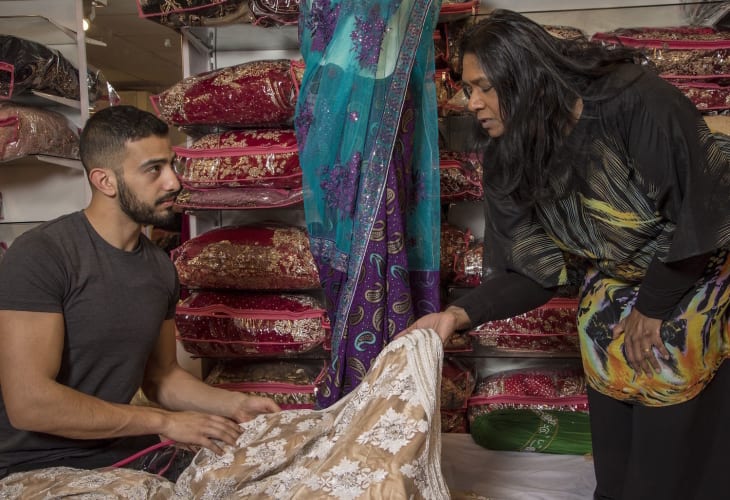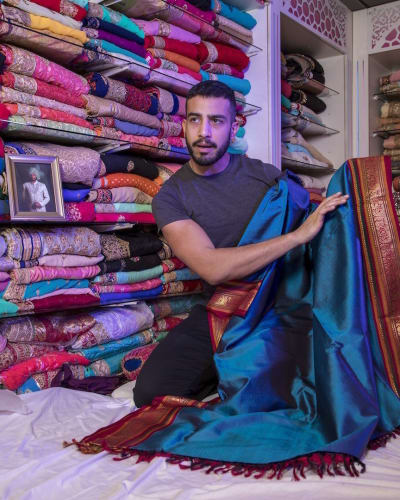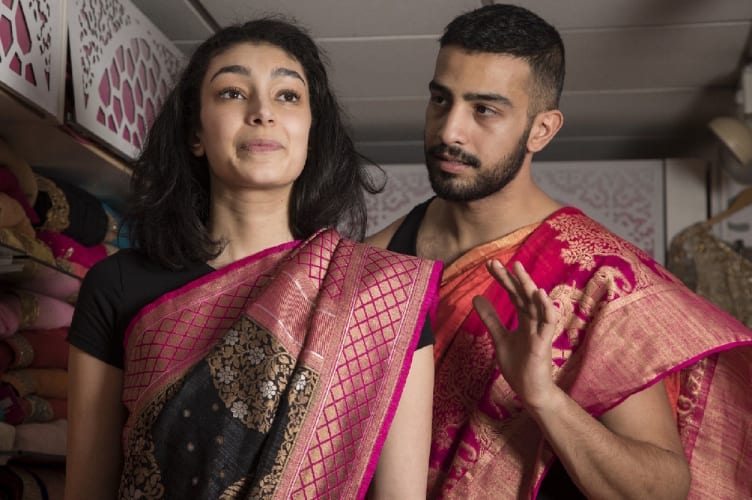“A chaos of colour” is how writer Rani Moorthy describes the traditional sari shops she remembers on her arrival in Britain in the mid-1990s.
She aims to incorporate this in her new play Handlooms, programmed by Curve Theatre but performed as a site-specific piece at Anokhi House of Sarees on Leicester’s renowned Golden Mile (and following performances in March in their sister shop Alankar House of Sarees in Manchester). The Golden Mile on Belgrave Road is widely recognised as the centre of Leicester’s Asian community, and is home to a multitude of shops selling silks, gold jewellery, and Indian sweets and savouries.
As an immersive (and non-seated) piece, we wear headphones during the hour-long performance and are encouraged to wander around the shop whilst the actors tell the story of Rajesh (Ashraf Ejjbair) and his mother Neeta (Rani Moorthy), owners of their sari business Handlooms.
Times are hard as customers now take their business online, and women now seem to wear their sari on special occasions, no longer an everyday garment “to do their chores”. Worried about the state of Handlooms’ finances, Neeta is frustrated by her son’s idealistic focus on creativity and craft over volume of sales. Matters come to a head when Neeta takes on Seeta, a young refugee from Sri Lanka, to make sari blouses, even though this runs the risk of a visit from the Immigration Office.
This could not be more pertinent, considering our treatment of immigrants and refugees and how this is portrayed in the media, but Handlooms also provides an opportunity to consider the cultural shifts in life as a British Asian across the generations. Clashes within cultures feature regularly in drama, however, channelling this through the sari and its changing place in Asian communities makes for an interesting new take on a familiar theme.
The majority of the play takes place on the natural stage provided by the raised, cushioned platform, normally used by shop assistants to show off the vast array of fabrics to brides, mothers, mothers-in-law et al.
Throughout the performance, Rajesh and Neeta take sari silks in a rainbow of colours, sequins and designs—throwing them out to reveal their detail to then carefully re-fold them, sometimes dressing themselves in the sari or returning the fabric to a neat square, working individually or together, mother and son; a mesmerizing love song to the sari.
Ejjbair plays Rajesh as calm and empathetic towards his female clientele, particularly in an amusing scene in the changing room with one of his more senior customers. He is a quiet foil to his outspoken, practical mother, and Moorthy’s monologue describing Seeta’s eventual deportation has emotional power. Scenes with Rajesh’s childhood streetwise friend Asha (Riana Duce) add humour and further examples of changing views within Asian communities living in Britain. The dénouement, as Rajesh fully embraces the freedoms he feels are represented by the sari, is handled sensitively (although perhaps a bit too tidily).
I am not convinced the headphones are necessary; yes, they add to the idea of an immersive performance, however, I found them uncomfortable, the actors are miked and the shop isn’t so large the actors are ‘lost’. There are also places where exposition tells rather than shows, however, the poetic language is enjoyable throughout, especially when combined with the dazzling sari fabrics, whose “silk is as soft as cocoa butter”.


